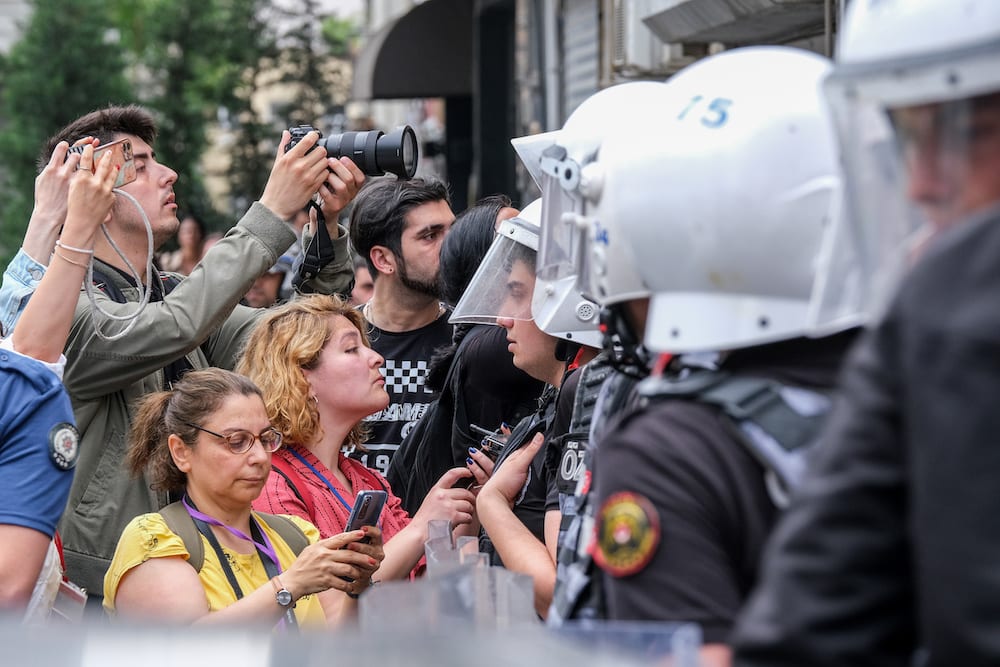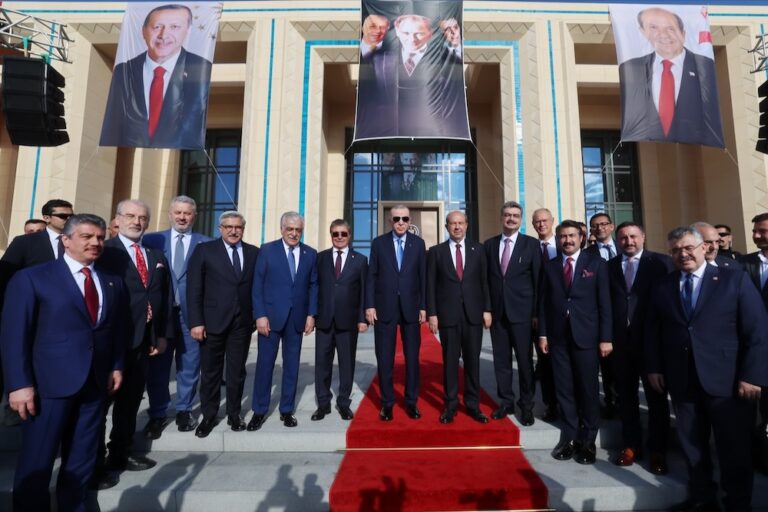June 2023 in Europe and Central Asia: A free expression round up produced by IFEX's Regional Editor Cathal Sheerin, based on IFEX member reports and news from the region.
Journalists and the LGBTQI+ community targeted in Turkey; Russia’s legislative attack on civic space; fewer journalists to persecute in Belarus; SLAPP news from UK and EU.
“Run Tayyip, run. Queers are coming!”
June ended with IFEX members and other rights groups calling on the EU to prioritise media freedom and human rights in its dealings with Turkey.
The preceding four weeks offered several examples of just how necessary that is:
On 8 June, the Council of Europe’s Committee of Ministers again called on Turkey to implement European Court of Human Rights (ECtHR) rulings and immediately release unjustly imprisoned civil society leader Osman Kavala and former co-chair of the pro-Kurdish People’s Democratic Party (HDP) Selahattin Demirtaş. Turkey has for years ignored ECtHR rulings that the two men be freed.
On 17 June, Kurdish journalist Sinan Aygül was viciously attacked by two men he identified as the mayor of Tatvan’s security guards. Aygül, who has faced dozens of prosecutions over the years because of his anti-corruption investigations, was warned against reporting on the mayor by his attackers.
On 22 June, journalist Sedef Kabaş went on trial again for “insulting the president”. The case against her is based on tweets in which she questioned the validity of President Recep Tayyip Erdoğan’s college diploma and made various allegations of corruption.
On 26 June, online and TV journalist Merdan Yanardağ was arrested on charges of “making propaganda for a terrorist organisation” following his on-air criticism of the prison conditions of Abdullah Öcalan, jailed leader of the outlawed Kurdistan Workers’ Party (PKK).
Fears that President Erdoğan would continue to promote anti-LGBTQI+ sentiment post-election have proved well-founded. His ongoing use of “pro-LGBT” as a pejorative in attacks on the opposition, and his homophobic speeches describing LGBTQI+ people as “perverse”, have created a climate of fear in which some LGBTQI+ people say they are considering leaving the country.
June was Pride Month, and it saw at least 160 people arrested across Turkey as they took part in several banned Pride marches and related events. Although judicial decisions in recent years have ruled that these bans are unlawful, public authorities continue to impose them. Marchers in Istanbul defied the ban, chanting, “Run Tayyip, run. Queers are coming!” Over 90 of them were detained.
PEN America issued a statement this month condemning the Turkish authorities’ attacks on LGBTQI+ civic space; the staff at Bianet released a video message of solidarity, in which they vowed to amplify LGBTQI+ voices and “highlight the human rights violations faced by LGBTQI+”.
“Undesirable organisations”
Squeezing civic space has been an integral part of President Putin’s domestic politics for several years. Since Russia’s invasion of Ukraine, a raft of laws has been passed to silence anti-war opposition and other kinds of dissent.
This month, the International Federation for Human Rights and MediaZona published a review of 50 laws adopted since 2018 to suppress civil society. You can discover more about these laws – which restrict LGBTQI+, civil society organisations, the internet, the right to protest, freedom of expression and more – by using MediaZona’s impressive interactive tool (in English).
Various public figures have been targeted by these laws in recent weeks. One of them is prominent human rights defender and co-chair of Memorial, Oleg Orlov. He went on trial this month on charges of repeatedly “discrediting” the Russian military, and faces up to three years in prison if convicted. The charges are based on Orlov’s one-man anti-war demonstrations and criticisms of the war that he posted on social media.
Another target of these laws is the environmental NGO World Wildlife Fund (WWF), which is now banned from operating in Russia after it was categorised as an “undesirable organisation” in June. WWF was accused of “threatening” the Russian economy and financing “foreign agents”.
Independent media outlet Noyava Gazeta Europe was also declared an “undesirable organisation” in June and banned from working in Russia. It was accused of disseminating “extremist material” and “false information”.
In May, Greenpeace Russia ended its operations in Russia after it too was labelled an “undesirable organisation”.
Belarus: Fewer journalists to persecute
Belarus’s crackdown on civil society continues.
In June, the Belarusian Association of Journalists (BAJ) reported that its logo had been listed as “extremist” content, putting those who use it – or have items bearing it – at risk of prosecution. BAJ, which was labelled “extremist” by the authorities earlier this year, and which was liquidated by the politicised Supreme Court in 2021, has warned all journalists in Belarus to remove any items bearing the logo from their homes and offices.
June also saw access to BAJ’s website blocked in Russia.
The number of political prisoners in Belarus continues to rise; by the end of June, there were 1,496 individuals languishing behind bars on politically-motivated charges. Among these prisoners is Tatsiana Pytsko, who was detained early in the month and charged with “creating or participating in an extremist organisation”. The charges against her are based on alleged assistance she gave to her cameraman husband (jailed in February) in the course of his work; her detention brings the number of media workers detained in Belarus to 34.
Several IFEX members and other rights groups highlighted the cases of two high-profile political prisoners in June – prominent opposition figure Maria Kalesnikava and human rights defender Nasta Loika – and called for their immediate release.
Kalesnikava, who was sentenced to 11 years in prison in 2021, is currently in solitary confinement and has been denied adequate access to medical treatment and legal representation. Loika, who has been tortured in detention, was handed a seven-year prison sentence during a closed trial this month; her prosecution was based on her work investigating human rights violations carried out by law enforcement officials.
A useful overview of the situation for independent journalists in Belarus was published this month by BAJ and Justice for Journalists. Their report, which mainly focuses on the period 2021-2022, examines several tools of persecution employed by the authorities against critical media. These include judicial harassment, violence, ill treatment in detention and cyber attacks (instances of the latter rose sharply during 2020-2021). Overall, the number of reported cases of persecution has decreased since 2020, but not for any positive reason: due to imprisonments, forced exile and decisions to abandon such a risky profession, there are now simply fewer journalists to persecute.
Strategic Lawsuits Against Public Participation (SLAPPs)
June saw some welcome developments for anti-SLAPP campaigners in the UK, but dispiriting news for their counterparts in the EU.
In the UK, the government added an anti-SLAPP amendment to the Economic Crime and Corporate Transparency Bill that is currently moving through parliament. If passed into law, the amendment will be the first anti-SLAPP measure in the UK.
The UK Anti-SLAPP Coalition welcomed the draft legislation as a first step towards tackling the problem of SLAPPs. Among the positive aspects of the amendment that the Coalition highlights in its overview are: a robust threshold for bringing a claim (i.e. it has to be more likely to succeed than fail); and cost protections for SLAPP defendants if they lose the case. On the negative side, the amendment can only be applied in cases relating to the “public interest in protecting society from economic crimes”, so is restricted in scope.
On the other side of the British Channel, governments at the Council of the EU agreed a “general approach” (a common position) on the long-awaited – and much campaigned for – EU anti-SLAPP directive. Frustratingly, their position waters down the original proposal considerably, taking a restrictive approach to several of its key provisions.
The Coalition Against SLAPPS in Europe (CASE) highlights the five “most concerning drawbacks”: it limits the scope of the directive to “cross-border” cases; it excludes from the directive’s scope civil claims brought in criminal proceedings; it weakens the early dismissal mechanism; it removes the provision on damage compensation in favour of SLAPP targets; it extends the transposition period to 3 years (i.e it delays national implementation).
The draft EU anti-SLAPP directive is expected to be finalised by the end of 2023.



